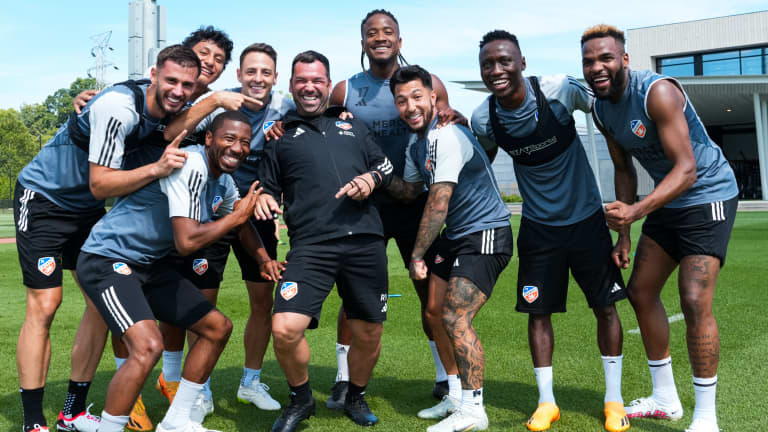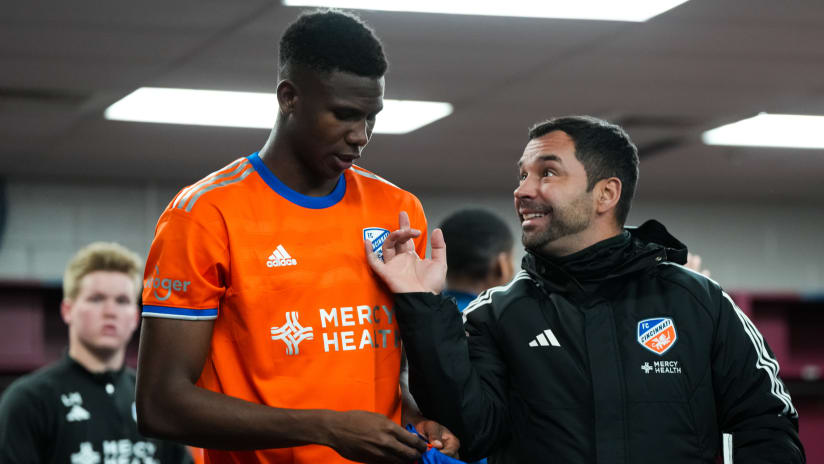The experience FC Cincinnati assistant and development coach Ricardo Paez brings to the club is as vast as it is deep.
The former Venezuelan national team star came to FC Cincinnati in 2019 as one of the club’s building blocks as it transitioned to MLS from USL. When director of player development Larry Sunderland came to FCC to build the Academy, he tabbed Paez to join the club and lead the U-17 team. Paez had previously coached at Orlando City SC and helped develop several first-team players from their Academy.
Paez would spend the next two seasons in Cincinnati helping to build the Academy from the ground up, head coaching U-17 and U-19 teams in his first year before splitting up the duties with now MLS NEXT Pro head coach Tyrone Marshall.
“It was always in preparation to continue growing as coach,” Paez said. “It was a very nice experience because I spent the first coaching stages of the Academy developing talent.”
After two years of service to the Academy, Paez joined the first team as an assistant coach. By providing experience in development and understanding of FCC’s Academy, Paez creates a trustworthy bridge to the pros for younger players while working with veteran players to help them reach their fullest potential.
“Like the career that I had as a player, the goal was to be able to reach the first team,” Paez said. “That possibility arose thanks to (FCC head coach) Pat Noonan and (FCC general manager) Chris Albright and they thought of me to continue with what I had been doing within the team with Tyrone Marshall in terms of my endeavors with the first team.
“Being a foreign coach and understanding the American side because my wife is American, I have both parts and I can connect with both cultures. It has been years of continuing to grow, to continue learning alongside Pat Noonan and the whole coaching staff, who have done an amazing job.”
‘Ricky,’ as he’s known inside the walls of FCC, has experience that no amount of classes or seminars can replicate. He has lived every aspect of the game to the fullest. His father, Richard Paez, has been a professional head coach in South America since the early 90s and most famously led the Venezuelan national team from 2001 to 2007, a team that Ricky made 68 caps for from 2000 to 2007.
On the club side, very few have seen as many corners of the world as he has. He played in 10 countries for 24 teams as a midfielder, appearing for famed clubs like Boca Juniors in Argentina, San Luis in Mexico, Veria FC in Greece and CD Castellón in Spain. He also appeared in Belgium, México, the United Arab Emirates, Ecuador, Colombia, Romania, Peru, and his native Venezuela.
Having been all over the world, Paez knows how it can be to come to a new country or a new club and have to acclimatize quickly. He aims to use his experience to better FC Cincinnati and help players reach their greatest selves.
“I can connect with both cultures,” Paez says. “I lived it. I have the advantage of living in different cultures that I had to play where I did not speak the language. I put myself in their place, and it is easier for me to connect with (the players); I experienced it personally, so it has helped me develop a relationship with them as a person they can trust.
“I think it helped a lot in this aspect so that the player feels that they can also provide an idea. Sometimes when one does not have that link to a person who can translate well or who can communicate the idea well, sometimes the player does not feel so comfortable.
“But I do feel that I gained the trust of the players because of the way I speak to them, the experience that I have had. That connection not only with the Latinos, but with all the players … in trying to unite the group, and that there is always this unity that has been seen this season in the results we have had.”

The culture created at FC Cincinnati under head coach Pat Noonan and his staff is fundamental to the success the team has seen on the field. FCC players have bought into the process that has earned them a Supporters’ Shield already and are looking for even more. On the pitch, in the locker room, and away from the game altogether, The Orange and Blue are united.
In no small part, Paez has played a role in creating that culture, helping FCC’s international roster not only communicate with each other, but feel at home as a team.
“I think what gives me the most happiness is when I see the coaching staff helping convince a group of players to be united and to make an idea come true,” Paez said. “The team believes in the ideas that we are planning and that is why we are getting results … that’s what I focus on in my work to help the coaching staff with Pat (Noonan) at the helm.”
As a native Venezuelan, his national pride is important to him. Serving as a regular for his home country’s senior national team is a point of pride for his professional career as a footballer, citing it as the ‘most important’ part of his career. His generation with the national team changed the reality of the sport for the nation, helping to bring them into the limelight of CONMEBOL and opening the door to future generations of success. Now, as a coach with the top club in MLS, winners of the Supporters’ Shield, he is mindful of his role and how hard he has to work to open the door to others from his home nation as a role model.
“It is not easy as a Venezuelan coach or player in a team abroad. I have to work twice as hard and be very proud of where I come from,” Paez said. “You have to with any heritage, but as a Hispanic, you have to work hard to achieve things, and it gives a lot of pride to go make those steps forward, little by little.
“One continues to grow with short but sure steps and always trying to be a good person first to help everything around the club. Not betraying my convictions, my values, always on the right path and very happy to be Hispanic and to be in this unified club. FC Cincinnati has a very good culture and identity and we have to continue making it bigger.”





